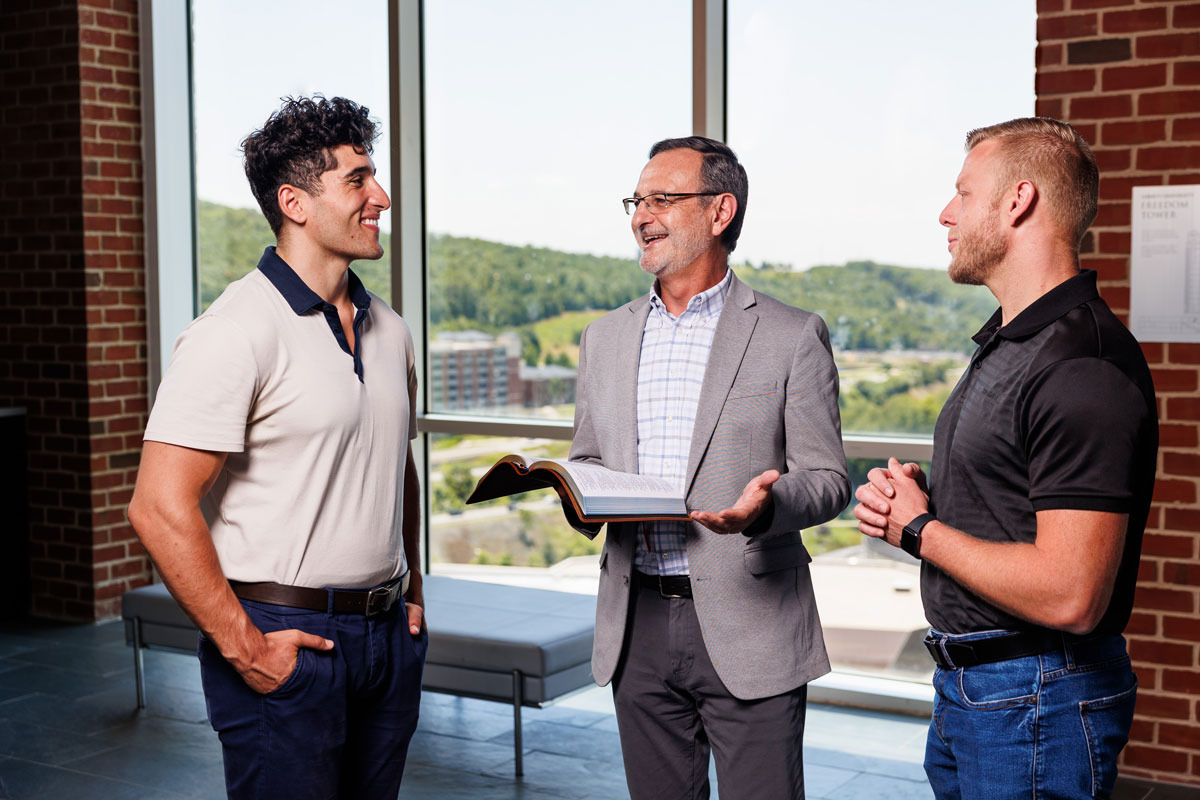Search News Archives
Filter News Articles
Additional Navigation
Students begin training on campus with drones
December 15, 2016 : By Drew Menard - Office of Communications & Public Engagement
A steady hum intensifies as sophomore Andrew Gorny maneuvers a matte black, lightweight quadcopter (a 3DR-SOLO, specifically) across the sky above Liberty University’s Liberty Mountain Intramural Complex and back toward the ground. Buzzing, the unmanned aerial vehicle (UAV), zips through the air like a giant beetle before coming to rest on the turf.
“Putting inputs into the controls and seeing how the aircraft responds to you is one of those things that you don’t get in the simulator,” Gorney said.
The exercise has become routine for Gorny, who along with another student in the School of Aeronautics’ Professional Unmanned Aerial Systems (UAS) Operator program, is training not only to gain experience flying these cutting-edge aircraft but also to instruct other students in flying as well.
“We are teaching students how to fly these systems, but then also how to instruct on these systems,” said Jonathan Washburn, director of Liberty’s UAS program. “This first group of students will instruct the next group, and then that group will become instructors and we will continue that pattern.”
Though recreational use of UAS has been growing rapidly, the Federal Aviation Administration only recently released its regulations regarding their commercial use. People often misunderstand these regulations, Washburn explained. Even if the pilot does not financially profit, if they are taking photos with a UAS that will benefit a company or customer, the use is considered commercial and is subject to the regulations. Furthermore, Washburn noted the danger of flying in the airspace above campus. Even a small UAV can severely injure a person or catastrophically damage an aircraft. The university will soon release guidelines for using UAS on campus for hobby and recreation.
Because Liberty’s campus is within 5 miles of a local airport, the airspace is considered “controlled,” requiring the university to apply for a waiver before incorporating on-campus flights into its training. With all the necessary approvals in place, Washburn is now incorporating flying both fixed-wing and multi-rotor small UAS (under 55 pounds) into the program.
“Our students are getting hands-on training with these vehicles. They are getting the skills required to be competitive in the job market,” Washburn said, noting that he has been working with departments like Marketing and the Cinematic Arts, Zaki Gordon Center to help with photography needs, which will open further opportunities for students.
“Now that we are flying for Marketing and other university departments, we can get the students actual real-world experience flying for customers,” he said.
The UAS industry is booming and in need of qualified college graduates (over 100,000 jobs are projected to be created over the next 10 years, according to a report by AUVSI). Liberty’s UAS program is meeting the need.
Through a partnership with Textron Systems, a company which operates the Aerosonde Medium Unmanned Aircraft System (an aircraft with a 12-foot wingspan that has been used by a number of agencies, including the U.S. Department of Defense and NASA), Liberty students can earn the same operator certification that Textron Systems requires of its employees. Students gain experience flying the Aerosonde at Textron Systems’ facility in Blackstone, Va. — a rare opportunity in the U.S. due to airspace restrictions. Because of the Textron Systems partnership, many Liberty UAS students are able to apply for a job before they even graduate from the program.
Liberty’s graduates are especially qualified to become UAS operators. In addition to their hands-on and classroom training with UAS, they also earn their private pilot’s license and instrument rating as part of a Bachelor of Science in Aeronautics (UAS is a specialization under the degree). These qualifications give Liberty students an edge in a budding industry.
“You already have an idea of what you are doing,” Gorny said. “You’ve been around the equipment and the aircraft and the software. It makes you more valuable. You have the experience.”
Gorney added that even though recreational flyers are responsible to know the regulations when they fly, he feels the classroom experience makes him more qualified for a job as a UAS operator.
“Employers don’t have to sit down with you and try to teach you brand new things,” he said. “You can reference a flight log that you have made and show them that you take (flying) very seriously. That gives me a leg up on job opportunities.”


